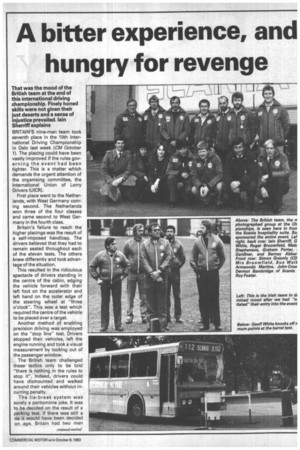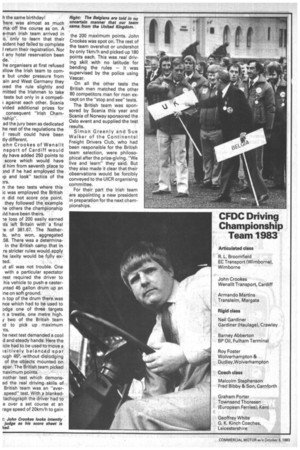A bitter experience, and hungry for revenge
Page 27

Page 28

If you've noticed an error in this article please click here to report it so we can fix it.
That was the mood of the British team at the end of this international driving championship. Finely honed skills were not given their just deserts and a sense of injustice prevailed. lain Sherriff explains BRITAIN'S nine-man team took seventh place in the 10th International Driving Championship in Oslo last week (CM October 1). The placing could have been vastly improved if the rules governing the event had been tighter. This is a matter which demands the urgent attention of the organising committee, the International Union of Lorry Drivers (UICR).
First place went to the Netherlands, with West Germany coming second. The Netherlands won three of the four classes and came second to West Germany in the fourth class.
Britain's failure to reach the higher placings was the result of a self-imposed handicap. The drivers believed that they had to remain seated throughout each of the eleven tests. The others knew differently and took advantage of the situation.
This resulted in the ridiculous spectacle of drivers standing in the centre of the cabin, edging the vehicle forward with their left foot on the accelerator and left hand on the outer edge of the steering wheel at "three o'clock". This was a test which required the centre of the vehicle to be placed over a target.
Another method of enabling precision driving was employed on the "stop line" test. Drivers stopped their vehicles, left the engine running and took a visual measurement by looking out of the passenger window.
The British team challenged these tactics only to be told "there is nothing in the rules to stop it". Indeed, drivers could have dismounted and walked around their vehicles without incurring penalty.
The tie-break system was surely a pantomime joke. It was to be decided on the result of a parking test. If there was still a tie it would have been decided on age. Britain had two men h the same birthday!
'here was almost as much ma off the course as on. A e-man Irish team arrived in o, only to learn that their sident had failed to complete I return their registration. Nor I any hotel reservation been de, he organisers at first refused 31I0w the Irish team to corn e but under pressure from am n and West Germany they ixed the rule slightly and mitted the Irishmen to take tests but only in a competi against each other. Scania vided additional prizes for consequent "Irish Chamnship".
ad the jury been as dedicated he rest of the regulations the I result could have been Ely different.
ohn Crookes of Wenallt nsport of Cardiff would 3Iy have added 250 points to score which would have d him from seventh place to and if he had employed the )p and look" tactics of the 3rs.
n the two tests where this ic was employed the British
n did not score one point. they followed the example ne others the championship fld have been theirs.
le loss of 200 easily earned .its left Britain with a final -e of 381.67. The Netheris, who won, aggregated
.58. There was a determina in the British camp that in re stricter rules would apply he laxity would be fully exted.
it all was not trouble. One with a particular spectator rest required the driver to his vehicle to push a casterJnted 45 gallon drum up an 'neon soft ground.
n top of the drum there was nce which had to be used to
Ddge one of three targets
n a trestle, one metre high. y two of the British team to pick up maximum its.
he next test demanded a cool d and steady hands. Here the icle had to be used to move a rsitively balanced spar >ugh 45°, without dislodging of the objects mounted on spar. The British team picked rlaximum points.
nother test which demonsed the real driving skills of British team was an "aver speed" test. With a blankedtachograph the driver had to e over a set course at an rage speed of 20km/h to gain the 200 maximum points. John Crookes was spot on. The rest of the team overshot or undershot by only 1km/h and picked up 180 points each. This was real driving skill with no latitude for bending the rules — it was supervised by the police using Vascar.
On all the other tests the British men matched the other 80 competitors man for man except on the "stop and see" tests.
The British team was sponsored by Scania this year and Scania of Norway sponsored the Oslo event and supplied the test results.
Simon Greenly and Sue Walker of the Continental Freight Drivers Club, who had been responsible for the British team selection, were philosophical after the prize-giving. "We live and learn" they said. But they also made it clear that their observations would be forcibly conveyed to the UICR organising committee.
For their part the Irish team are appointing a new president in preparation for the next championships.




































































































